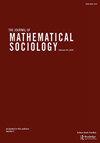争议政治的机制:一种基于代理的建模方法
IF 0.7
4区 社会学
Q3 MATHEMATICS, INTERDISCIPLINARY APPLICATIONS
引用次数: 7
摘要
摘要“有争议的政治”已成为定义一系列先前分离的研究领域的主要标签,这些领域包括集体行动、激进化、武装叛乱和恐怖主义等主题。在过去的二十年里,学者们试图将这些不同的线索结合到一个统一的研究领域中。在这样做的过程中,他们开发了一种方法来分离和分析几种不同历史现象背后的共同社会和认知机制,如“叛乱”、“革命”、“激进化”或“恐怖主义”。采取了一种多学科的方法,对经济学、社会学和心理学等不同领域的贡献开放。本文的目的是增加竞争政治(CP)领域的多学科性,并将基于代理的建模和网络博弈论的工具引入到本文中分析的一些基本机制的研究中。特别是,本文中提出的模型描述了一个过程的动力学,在这里被定义为“政治的激进化”,及其主要的潜在机制。它们的机制是在不同的社会背景下进行分析的,这些社会背景由四个参数的值区分:镇压程度、不平等、社会宽容和相互联系。该模型可用于解释激进化、民粹主义和民众叛乱等不同现象背后的基本动力。在最后一部分中,通过Python模拟对以上述四个参数的不同值为特征的不同社会进行了测试,从而概述了我们模型的机制可以根据其运行环境形成的不同结果。本文章由计算机程序翻译,如有差异,请以英文原文为准。
The mechanics of contentious politics: an agent-based modeling approach
ABSTRACT “Contentious politics” has become the main label to define a wide range of previously separated fields of research encompassing topics such as collective action, radicalization, armed insurgencies, and terrorism. Over the past two decades, scholars have tried to bring these various strands together into a unified field of study. In so doing, they have developed a methodology to isolate and analyze the common social and cognitive mechanisms underlying several diverse historical phenomena such as “insurgencies,” “revolutions,” “radicalization,” or “terrorism.” A multidisciplinary approach was adopted open to contributions from diverse fields such as economics, sociology, and psychology. The aim of this paper is to add to the multidisciplinarity of the field of Contentious Politics (CP) and introduce the instruments of Agent-Based Modeling and network game-theory to the study of some fundamental mechanisms analyzed within this literature. In particular, the model presented in this paper describes the dynamics of one process, here defined as “the radicalization of politics,” and its main underlying mechanisms. Their mechanics are analyzed in diverse social contexts differentiated by the values of four parameters: the extent of repression, inequality, social tolerance, and interconnectivity. The model can be used to explain the basic dynamics underlying different phenomena such as the development of radicalization, populism, and popular rebellions. In the final part, different societies characterized by diverse values of the aforementioned four parameters are tested through Python simulations, thereby offering an overview of the different outcomes that the mechanics of our model can shape according to the contexts in which they operate.
求助全文
通过发布文献求助,成功后即可免费获取论文全文。
去求助
来源期刊

Journal of Mathematical Sociology
数学-数学跨学科应用
CiteScore
2.90
自引率
10.00%
发文量
5
审稿时长
>12 weeks
期刊介绍:
The goal of the Journal of Mathematical Sociology is to publish models and mathematical techniques that would likely be useful to professional sociologists. The Journal also welcomes papers of mutual interest to social scientists and other social and behavioral scientists, as well as papers by non-social scientists that may encourage fruitful connections between sociology and other disciplines. Reviews of new or developing areas of mathematics and mathematical modeling that may have significant applications in sociology will also be considered.
The Journal of Mathematical Sociology is published in association with the International Network for Social Network Analysis, the Japanese Association for Mathematical Sociology, the Mathematical Sociology Section of the American Sociological Association, and the Methodology Section of the American Sociological Association.
 求助内容:
求助内容: 应助结果提醒方式:
应助结果提醒方式:


